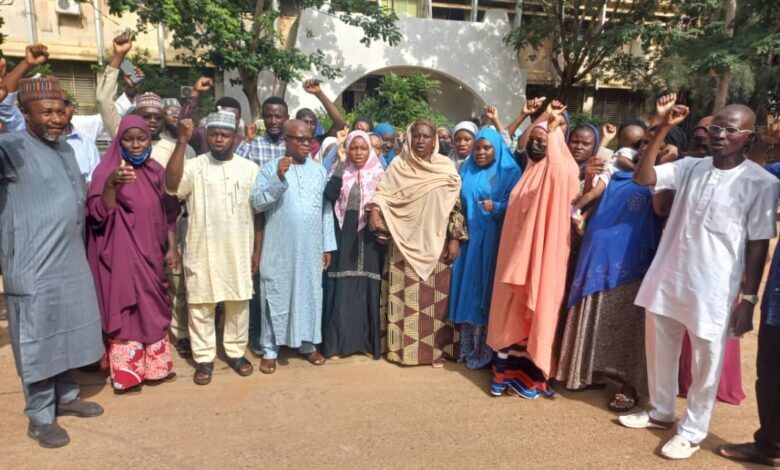#AK9TrainPassengers: Two Months After, Government Yet To Take Proactive Steps As Victims Remain In Captivity
Since March 28, 2022, over 60 passengers have remained in captivity, following a terror group’s attack on the Kaduna-Abuja train in Kaduna, Northwest Nigeria.

It’s been two months since terrorists carried out a deadly attack on a train transporting passengers between Nigeria’s capital, Abuja, and Kaduna in the Northwest.
The March 28 attack and abduction triggered public outrage, revealing the nexus between terrorists in Northwest and Northeast Nigeria.
While eight persons were confirmed killed in the incident, many others were kidnapped and are still missing, with some of their families saying they were been contacted by the abductors only in the days following the attack. Since then, they have heard nothing.
But two months after the incident, authorities are yet to give updates on efforts in place to secure the release of the victims.
Worried by this silence, the loved ones of the affected people staged a protest on Thursday, April 7, at the Radio House in Abuja. But not much has changed since.
During the protest at Radio House, HumAngle captured how Nigeria’s federal authorities refused to address the victims’ relatives. Aides attached to the minister of state for transportation, Gbemisola Saraki, had rough-handled journalists covering the protest in a bid to protect the administration from “embarrassment”.
Some family members of the victims also spoke about the sad experience of having loved ones in captivity for over a month.
“I barely sleep and eating is a problem,” said Ballie Moses, whose sibling is yet to be released. “I wake up in the middle of the night and think of how they are doing out there. Usually, sometimes I go to her room and say a word of prayer for her.”
On May 9, 2022, in a statement signed by Andulfatai Jimoh and Ba’abba Muhammed, leaders of the relatives of AK9 Abuja-Kaduna train kidnapped passengers, the group lamented the “emotional, psychological, mental, and physical torture” they are passing through.
Amidst all these, the Nigerian Railway Corporation (NRC), on May 16, announced the resumption of the Abuja-Kaduna train services. The planned resumption was however, postponed as some lawyers filed a lawsuit to stop the train services until adequate protection of citizens against terrorists is ensured.
The terrorists have also released a couple of videos threatening to kill victims in their captivity.
Though Nigeria’s Constitution stresses that the primary duty of the government is to ensure the security and welfare of the people, Nigerians continue to have their rights violated by rising insecurity.
HumAngle contacted the office of transportation Minister Rotimi Amaechi who did not respond nor comment. Amaechi is currently campaigning to become Nigeria’s next president, a declaration he made after the railway attack victims’ relatives were ignored at the ministry of transportation.
Amaechi’s spokesperson, David Iyofor, has also ignored repeated questions sent to him about the silence of the ministry. Although he responded to HumAngle’s call, he quickly ended the phone call, saying that he was “busy” when confronted with questions on the #AK9TrainPassengers.
President Muhammadu Buhari’s spokespersons, Femi Adesina and Garba Shehu did not respond to HumAngle’s calls and text messages seeking comments on the issue.
Abdul Mahmud, a lawyer and rights activist had earlier noted that the silence and inaction of the Federal Government show their unwillingness to comply with what the 1999 Constitution commands in sections 14 and 17.
“It is the duty of the government to secure lives and property. If those who govern us appreciate the sanctity of life, they should have taken steps to set up an incident room from which officials address families of victims. Silence or inaction isn’t the greatest problem confronting citizens today. The greatest problem is the refusal of the government to prioritise threats to national security,” he said.
“If the government considers the derailment of a train as a security threat, it should be able to roll out extraordinary security measures to confront the threat. The illiteracy in the way those who govern us propose public policy is mind-boggling,” Mahmud added.
Support Our Journalism
There are millions of ordinary people affected by conflict in Africa whose stories are missing in the mainstream media. HumAngle is determined to tell those challenging and under-reported stories, hoping that the people impacted by these conflicts will find the safety and security they deserve.
To ensure that we continue to provide public service coverage, we have a small favour to ask you. We want you to be part of our journalistic endeavour by contributing a token to us.
Your donation will further promote a robust, free, and independent media.
Donate HereStay Closer To The Stories That Matter




